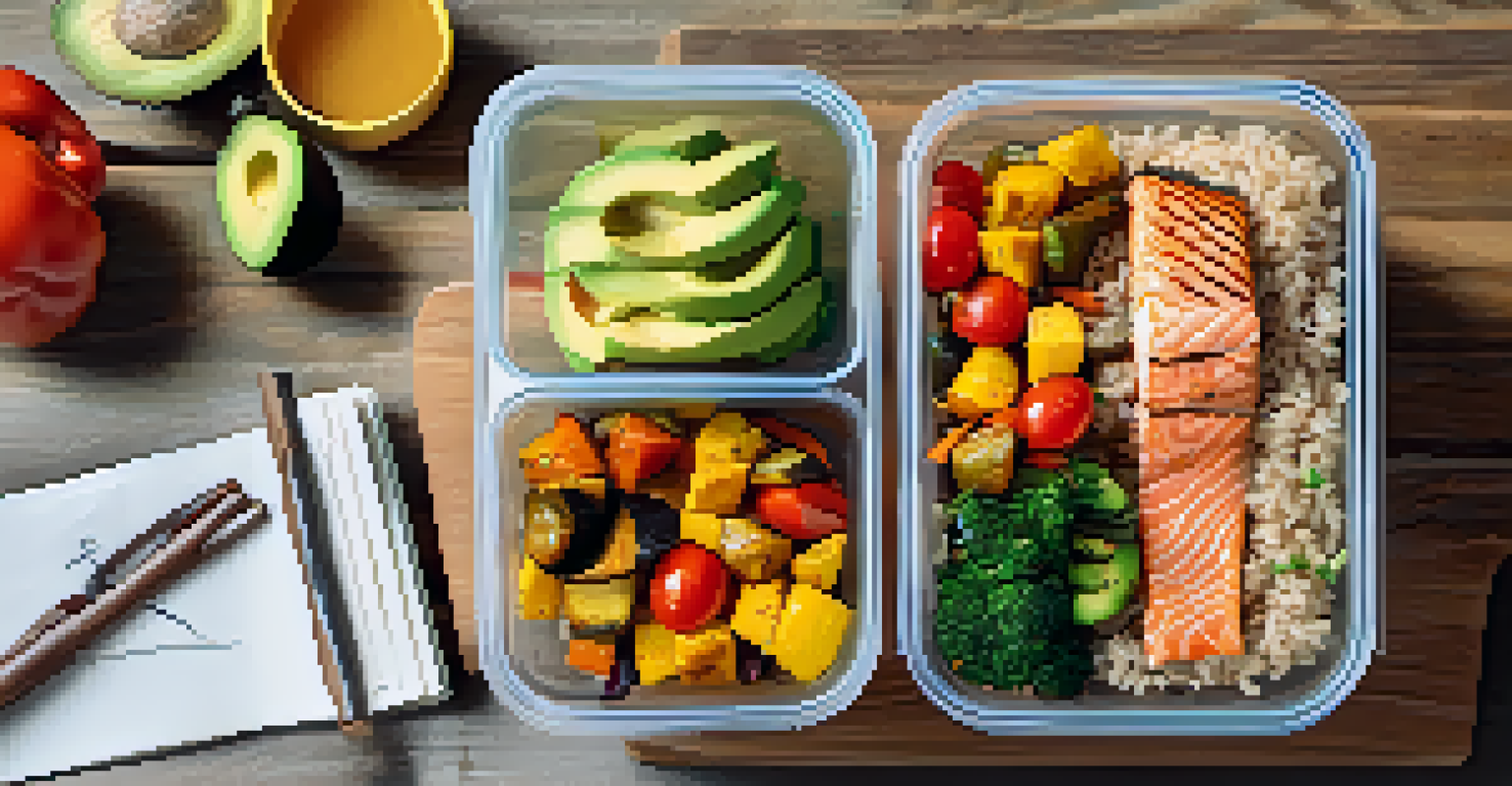The Impact of Nutrition on Muscle Hypertrophy: Essential Guide

Understanding Muscle Hypertrophy and Nutrition Basics
Muscle hypertrophy refers to the increase in muscle size through resistance training, and nutrition plays a vital role in this process. Proper nutrition provides the building blocks your body needs to repair and grow muscle tissue after workouts. It’s not just about lifting weights; what you eat before and after your training sessions can significantly influence your results.
Nutrition is not just about eating. It's an embodiment of the principles of health and wellness.
To support hypertrophy, it's essential to understand the macronutrients involved: proteins, carbohydrates, and fats. Proteins are crucial as they offer amino acids, which are the building blocks of muscle. Carbohydrates provide the energy needed for effective workouts, while healthy fats assist in hormone production, including those related to muscle growth.
By striking a balance between these macronutrients, you can create an optimal environment for muscle growth. For instance, a meal rich in protein and carbohydrates post-workout can help replenish energy stores and kickstart recovery, setting the stage for muscle gain.
The Role of Protein in Muscle Growth
Protein is often hailed as the king of nutrients for muscle hypertrophy. Consuming adequate amounts of protein helps stimulate muscle protein synthesis, the process through which the body repairs and builds muscle fibers. This is why many fitness enthusiasts emphasize protein intake, especially around their workout times.

The recommended dietary allowance for protein varies, but a general guideline for those looking to build muscle is around 1.6 to 2.2 grams per kilogram of body weight. Sources such as lean meats, dairy, legumes, and plant-based proteins can all contribute to meeting this requirement. Timing your protein intake, such as having a protein-rich meal or shake post-workout, can maximize its benefits.
Nutrition Fuels Muscle Growth
Proper nutrition, including a balance of proteins, carbohydrates, and fats, is crucial for supporting muscle hypertrophy and recovery.
Moreover, not all proteins are created equal. Complete proteins, which contain all essential amino acids, like those found in animal products, are particularly effective for muscle growth. Incorporating a variety of protein sources into your diet can ensure you’re getting a wide range of amino acids to support your fitness goals.
Carbohydrates: Fueling Your Workouts
Carbohydrates are often misunderstood, but they are a critical component for anyone looking to enhance muscle hypertrophy. Think of carbohydrates as the fuel for your body’s engine; without enough fuel, your performance can suffer, and muscle growth may be stunted. Including the right carbs in your diet can provide the energy needed for intense workouts.
You are what you eat, so don’t be fast, cheap, easy, or fake.
Complex carbohydrates, such as whole grains, fruits, and vegetables, offer sustained energy for longer workouts. They help maintain blood sugar levels and prevent fatigue, allowing you to push harder during your training sessions. In contrast, simple carbohydrates can provide a quick energy boost, making them ideal for pre- or post-workout snacks.
Balancing your carbohydrate intake around your workouts is key. Consuming carbohydrates along with protein after exercising can replenish glycogen stores and promote better recovery, ultimately supporting muscle growth.
Fats: Essential for Hormone Production
While often viewed with skepticism, dietary fats are essential for muscle hypertrophy. They play a significant role in hormone production, including testosterone and growth hormone, both of which are crucial for muscle growth. Including healthy fats in your diet can help optimize these hormonal responses.
Sources of healthy fats include avocados, nuts, seeds, and olive oil. Incorporating these into your meals can not only enhance your overall nutrition but also support muscle-building processes. However, moderation is key, as fats are calorie-dense and can lead to excess energy intake if not monitored.
Hydration Aids Performance
Staying hydrated is essential for optimal muscle function and recovery, helping to prevent fatigue and cramping during workouts.
It’s important to remember that fats should not be eliminated from your diet. Instead, aim for a balanced approach that includes a variety of nutrient-dense foods to support your overall health and fitness goals.
Hydration: The Unsung Hero of Muscle Growth
Hydration is often overlooked in discussions about nutrition and muscle hypertrophy, yet it plays an essential role in overall performance and recovery. Water is vital for nutrient transport and helps maintain optimal muscle function during workouts. Staying hydrated can also prevent fatigue and cramping, which are detrimental to training.
The amount of water needed can vary based on factors like body size, activity level, and climate. A good rule of thumb is to drink water regularly throughout the day and to ensure adequate hydration before, during, and after workouts. This is especially important if you are engaging in intense training sessions.
In addition to plain water, you can also hydrate through foods with high water content, such as fruits and vegetables. Electrolyte drinks can be beneficial during prolonged workouts to help replenish lost minerals, ensuring that your muscles can perform at their best.
Meal Timing: Optimizing Nutrient Intake
Meal timing can significantly impact muscle hypertrophy, especially when it comes to workout nutrition. Consuming the right nutrients at the right times can enhance performance, recovery, and muscle growth. This is why many athletes focus on their pre- and post-workout meals to ensure they’re maximizing their results.
A pre-workout meal that includes carbohydrates and protein can provide the necessary energy for your workout and help prevent muscle breakdown. On the other hand, a post-workout meal rich in protein and carbohydrates aids in recovery and muscle repair, ensuring that your body is primed for growth.
Timing Enhances Nutrient Use
Strategically timing your meals around workouts can significantly improve performance and muscle growth by optimizing nutrient intake.
Experimenting with meal timing can help you find what works best for your body. Some people may benefit from a larger meal a few hours before exercising, while others might prefer a snack closer to their workout time. Listening to your body and adjusting your nutrition accordingly can lead to better performance and results.
Supplements: Do They Really Help?
When it comes to muscle hypertrophy, many people wonder whether supplements are necessary. While a well-rounded diet should provide most of the nutrients you need, certain supplements can offer benefits for those looking to enhance their muscle-building efforts. However, it’s important to approach supplementation thoughtfully.
Whey protein is one of the most popular supplements among athletes and bodybuilders. It’s a convenient way to ensure you’re meeting your protein needs, especially post-workout. Other supplements, such as creatine, branched-chain amino acids (BCAAs), and beta-alanine, have also gained popularity for their potential benefits in improving performance and recovery.

That said, supplements should not replace whole foods but rather complement a balanced diet. It’s always best to consult with a healthcare professional or a nutritionist before starting any supplementation to ensure it aligns with your individual goals and needs.